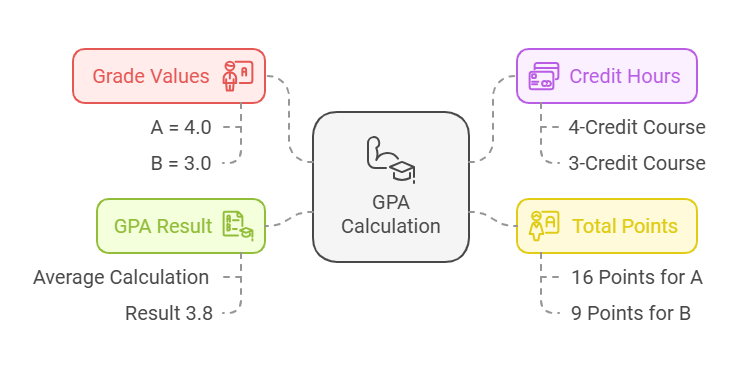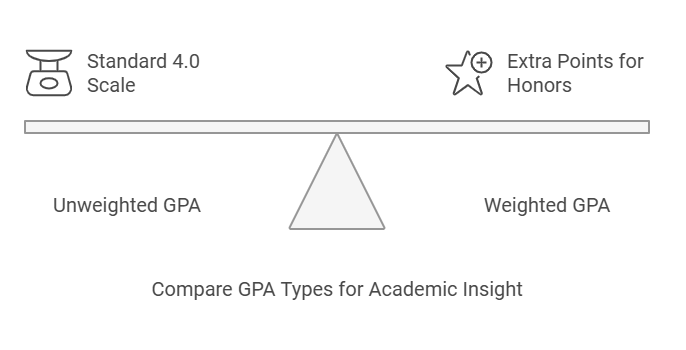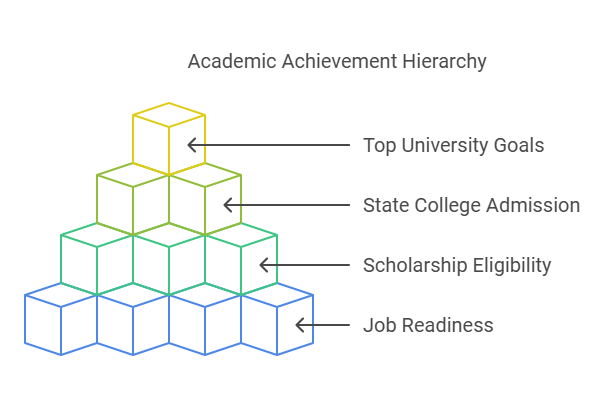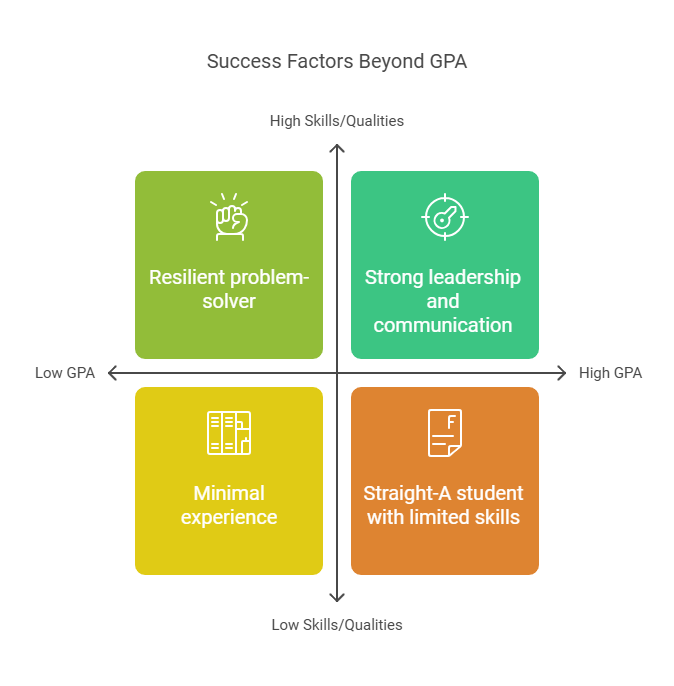
Share Post:
A good GPA often feels like the ultimate key to success, especially when you are navigating the challenges of high school or college.
But what makes a GPA “good”? And how is that number even calculated?
If you have ever stressed over every grade, worried about slipping even a little, or wondered how others seem to balance it all, you are not alone.
Grades are important, but they are not the full story of your abilities or potential. In this article, we will explore what a “good” GPA really means, how it varies depending on your goals, and the straightforward process behind calculating it.
Let’s make sense of it all, together.
Table of Contents
ToggleWhat Does GPA Mean and Why Does It Matter?
Grade Point Average is a numerical representation of your academic performance. It reflects the average of your grades over a set period.
For example, if your score is 4.0, it typically means you earned straight A’s. A 3.5 might indicate a mix of mostly A’s and B’s, while a 2.0 shows C’s as the predominant grade. Schools and employers often use this number to gauge consistency, dedication, and effort.
What Is GPA in Simple Terms?

Schools assign a value to each grade (like A = 4.0, B = 3.0, and so on).
By averaging these values, you get your GPA.

For example:
An “A” in a 4-credit course = 16 points (4.0 x 4).
A “B” in a 3-credit course = 9 points (3.0 x 3).
Add your total points and divide by your total credits. If the result is 3.8, that is your GPA.
Why Is it Important
It matters because it often serves as a first impression. Colleges, employers, and even graduate programs look at it to quickly assess academic ability.
A strong score can open doors to scholarships, internships, and admissions opportunities.
However, it is not the only thing that defines your skills or future potential. If you need additional help to understand all the details and effects of it, the best solution is college admissions consulting.
There are Different Types
There are two main types of GPA to keep in mind:
- Unweighted: Measured on a standard 4.0 scale, regardless of course difficulty.
- Weighted: Includes extra points for advanced or honors courses. For instance, an A in an AP class might count as 5.0 instead of 4.0.
How to Know If Your Score Is Good for Your Goals

A “good” one depends entirely on your goals. For a high school student aiming for Ivy League colleges, a GPA of 3.8 or higher might be the target.
For someone applying to trade schools, a 2.5 might still be acceptable. In most cases, what is considered good varies based on your ambitions, the programs you are interested in, and even regional or school-specific standards.
Benchmarks for Different Paths
Top Universities: Aim for 3.7 or higher for competitive programs.
State Colleges: Between 2.5 and 3.5 is often acceptable.
Scholarships: Many scholarships require 3.0 or higher,
Jobs or Internships: Employers may prefer candidates with GPAs above 3.0, but relevant skills and experience typically outweigh the number.
Why Your Goal Should Be Flexible
Not every field weighs the score equally. STEM programs may require higher GPAs due to rigorous academic standards, while creative fields typically value portfolios over numbers.
Focus on building a profile that matches your goals, which includes your GPA but also extracurriculars, projects, and networking efforts.
When to Reassess Your Goals
If your score is below your desired range, take a moment to reassess:
- Are your goals realistic for your current academic standing?
- Are there alternate programs or schools that value skills over grades?
- Can you realistically improve your GPA within the time you have left?
How Different Schools and Programs See a Good GPA
What counts as a good GPA depends on the institution or program. High schools, colleges, and graduate schools each have their own standards.
For example, a community college may accept applicants with a 2.5, while elite universities might require at least a 3.8.
Why Standards Vary
Each school sets expectations based on its mission and applicant pool. Competitive programs often focus on academic excellence, while others prioritize accessibility. Research what matters most for your chosen path to know where you stand.
How to Improve Your GPA Without Burning Out
Improving your grades does not mean sacrificing sleep or mental health. Small, steady changes make a big impact over time.
Focus on raising grades in courses where you can realistically improve.
Practical Tips
- Prioritize assignments with the most weight on your grade.
- Seek help from teachers, tutors, or classmates.
- Break study sessions into manageable chunks to avoid exhaustion.
Know Your Limits
It is okay if perfection is not possible. Focus on doing your best in the time you have left. Even small increases can make a difference for applications.
Common Myths You Should Ignore

There are many misconceptions about grades. One common myth is that only straight-A students succeed. Another is that GPA determines your future entirely. Both are false.
You Need a Perfect GPA
Colleges and employers care about more than grades. They look at your work ethic, experiences, and unique qualities. A less-than-perfect GPA is not the end of the world.
A Low GPA Means No Opportunities
There are plenty of paths to success. Trade schools, community colleges, and second-chance programs offer options for every student.
GPA Is Not the Only Measure of Success
Grades matter, but they are not everything. Skills, passion, and resilience often outweigh a GPA in the long run. Employers and schools know this.
What Else Matters
Strong communication, leadership, and problem-solving skills can impress more than any number. Build a well-rounded profile that highlights your strengths.
FAQs
Last Words
Your GPA is just one piece of your academic puzzle. It reflects your performance in a measurable way, but it does not define your intelligence, potential, or worth. Whether you are striving for higher grades or exploring alternative paths, remember that success comes in many forms.
Focus on your goals, put in the effort where it matters, and do not let a single number hold you back. Your journey is unique, and so is the impact you can make beyond the classroom.
Related Posts:
- Who Invented Math: History, Facts and Table of Numerals
- 8 Fun Activities to Practice Fractions and Mixed…
- What Are BODMAS, BIDMAS, and PEMDAS? A Simple Explanation
- What is a Point in Geometry? Definition and Examples
- What Is the Average IQ and How Is It Measured?
- Best 8 Online Classes for Kids Who Love Drawing and…











